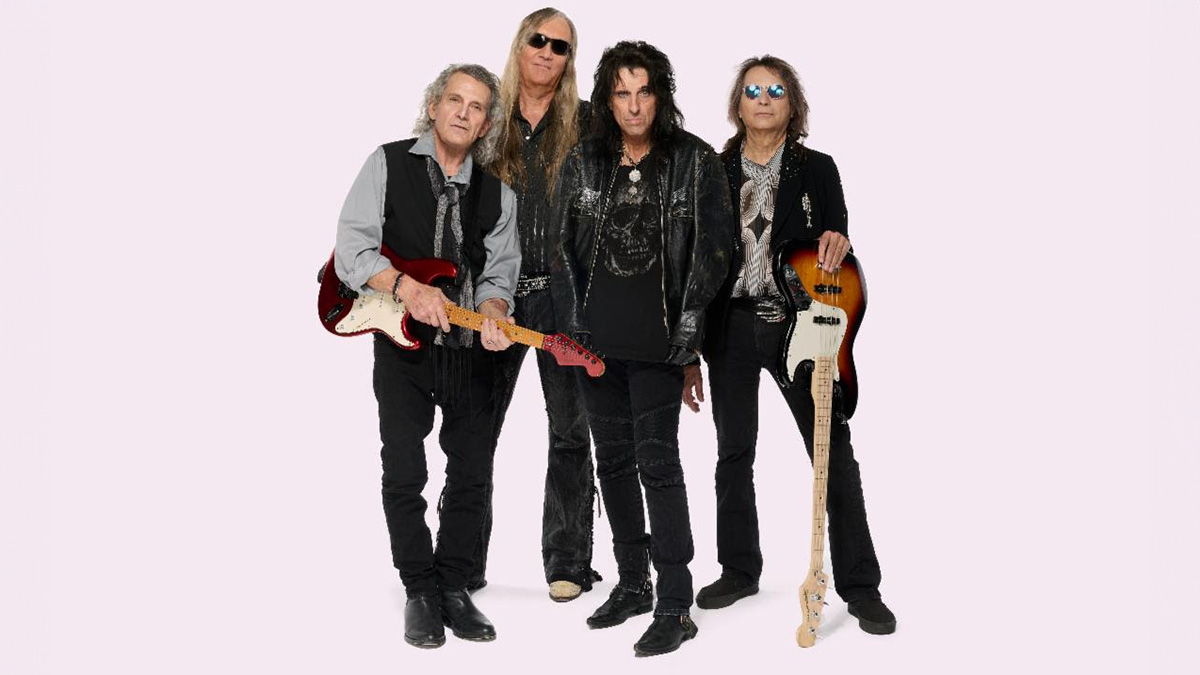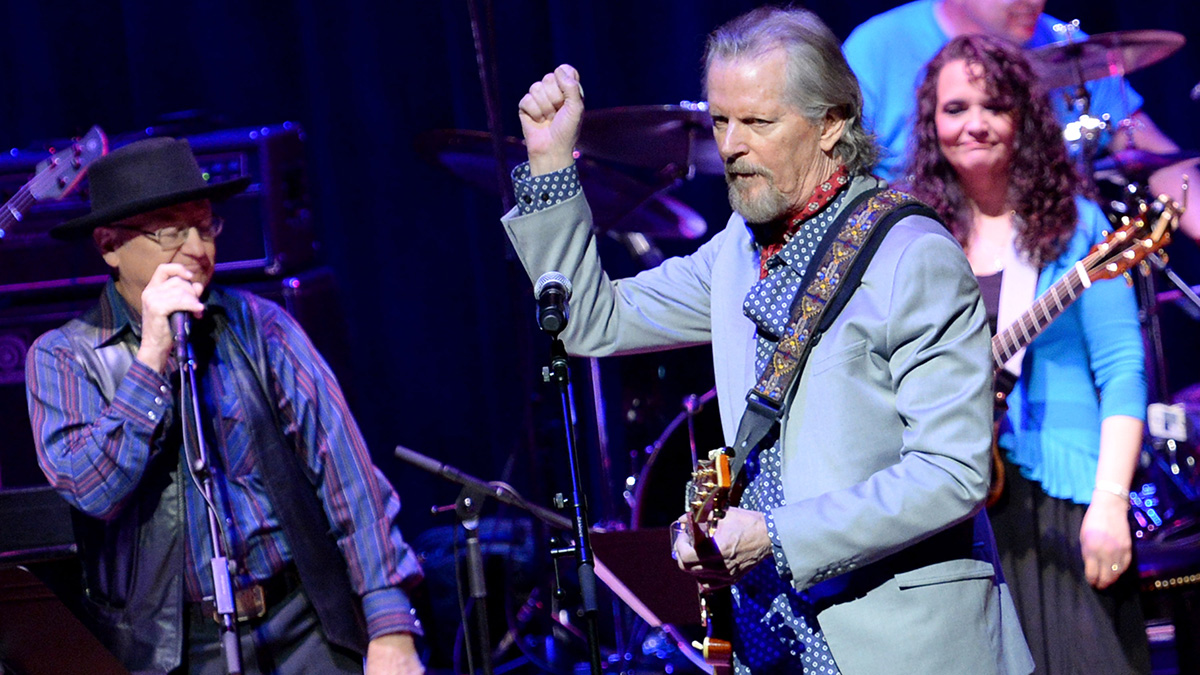Interview: Thin Lizzy Guitarist Damon Johnson on Musical Diversity and the Art of Listening

Like most musicians growing up in the 1970s, Damon Johnson fell in love with the music that is now considered “classic rock.”
The volume, the stage presence, the dual guitars — it all spoke to a young man growing up in Alabama and dreaming of being onstage with his idols.
Years later, that’s exactly what happened: Johnson was selected to join Alice Cooper’s band in 2004 and is now a member of Thin Lizzy, touring the world with musicians who influenced him as a teen.
It’s certainly not his first experience with success. Johnson’s foray into the world of record deals and touring came with a group called Witness. He also fronted his own band, Brother Cane, with whom he recorded three albums, charted several singles, gained a wealth of music industry knowledge and opened for Van Halen, Aerosmith, Robert Plant, Lynyrd Skynyrd and Candlebox.
Brother Cane developed such a loyal following that fans are still asking for more — so much so that the 2012 lineup, which will include Shinedown guitarist Zach Myers, has some Midwestern dates booked in March.
Johnson, ever the workaholic, has had several other successful projects over the past decade. He wrote, recorded and performed with Slave To The System, Red Halo and Whiskey Falls, has had his songs recorded by artists such as Stevie Nicks, Carlos Santana and Sammy Hagar, and has done session work with Hagar, Faith Hill, John Waite, Ted Nugent and the Temptations.
In this interview, Damon Johnson discusses his many professional blessings, what it takes to be the guy who gets the callbacks, and his passion for two-guitar bands.
Get The Pick Newsletter
All the latest guitar news, interviews, lessons, reviews, deals and more, direct to your inbox!
You have an amazing and certainly enviable resume.
I feel so elated to be a part of Thin Lizzy. I talked to several of my friends and family about it over the holidays, and you would think, after doing seven weeks with them when we did the run with Judas Priest in the United States, that some of the excitement would wear off a little bit, but it certainly has not. It’s still kind of unbelievable — to be so influenced by one particular band your entire career; not just the guitar players, but also the lyrics, the songwriting, the arrangements, the vibe, the whole thing, and then to be asked to join that band! That just doesn’t happen.

I guess it’s a lot like the Mark Wahlberg movie Rock Star, when he gets plucked from the audience and becomes the lead singer for his favorite heavy metal band. I don’t know what else to compare it to. It’s really special and I feel really proud. I’m so grateful to Alice Cooper, who is one of my closest friends in the world now. We worked together five out of the last seven years, and the Thin Lizzy opportunity would have never happened if not for Alice. I’m really grateful to him and all the guys in that band. Their excitement about the whole thing has been awesome. It makes me feel great about making the transition to get that kind of support from people who have become my family. It’s just a lot of good energy around the entire thing.
What do you bring to the table that makes A-list musicians want to work with you?
I guess it’s a combination of things. My diversity as a player and being a fan of music. I try to always focus on listening. If I’m writing or recording with someone, or preparing a show to go out and perform, I try to listen really well and pay attention to what the other players are doing or what the song calls for at that moment. I guess being put into so many situations over the years helps your confidence when you go into a new opportunity, and obviously, too, I’m really comfortable making other people feel comfortable.
So many young players come up and ask me, “How can I get a job with Alice Cooper or John Waite or Brother Cane? How can my band get it going?” I tell them that it’s beyond the playing and writing and performing. You’ve got to be able to get along with people. Alice will tell you that’s half the audition in itself.
It’s not just about “Can you play?” It’s “Can I live with you for six months out of the year on the road?” You spend way more time sitting in dressing rooms and airports and bus rides than you do actually playing music. Scott Gorham laughs; he calls it my Southern congeniality. Maybe it’s growing up in the South, I don’t know, but both of my parents are incredibly social people. My mom is a school teacher, my dad is a salesman, and I think I picked up a few things from them by osmosis as it relates to getting along with people, and at the same time working hard, keeping that work ethic. I guess that has really played a part in opening a lot of these doors.
Several of your projects are two-guitar bands. Is that a preference or by default?
I think the two-guitar thing goes back to being a kid and loving Thin Lizzy, Aerosmith, Lynyrd Skynyrd, the Allman Brothers, just having a guitar support underneath a solo section or being able to work out some harmonies. I’ve loved that stuff forever. I’m no different than anybody else. I worship the wizards like Eddie Van Halen, Jeff Beck and Jimmy Page, but that’s a lot of real estate to cover by yourself. I can do it, and I’ve done it in situations that were a lot of fun being that guy, but I like the sound of more guitars, multiple parts and that kind of thing going on.
I guess maybe it is ironic that I would grow up practicing a lot, learning so many parts and licks by Steve Lukather and Jeff Beck, but trying to find that lead singer for Brother Cane, not finding the lead singer and all of sudden I’m at the mic and I need that other guitar player. That was a real key event for me because I didn’t have enough energy to be the lead player and the lead singer at a time when lyrically we were just trying to write great songs that connected with people.
So it wasn’t so much about the technical aspect of being the guitar player anymore as it was trying to get a great connection with the emotion of the song. So it’s ironic that all these years later, here I am in one of the greatest guitar bands of all time, of all time, it’s been so mind-blowing to tell my peers, my musician friends, “I’m in Thin Lizzy!” And they’re like, "You’re fucking what? Thin Lizzy? Holy shit, that’s amazing!” Because whenever we get together, we talk about Peter Frampton, Humble Pie, the Yardbirds, there’s always those discussions going on. I guess you’ve pointed out something for me: really and truly, I am a fan of two guitars versus one.
Do you still reach for those Southern roots when you’re seeking inspiration?
I do. I absolutely do. For a long time I thought I had to expand or listen to more contemporary stuff, and I do; I love hearing something new that connects with me or that moves me, but I think there’s enough inspiration in my favorite music to carry me for the rest of my life. I don’t get a sense that Muddy Waters or Chubby Checker were running down the street to buy the new Elton John record or the new Led Zeppelin record. They were still listening to the stuff that got them excited in the very beginning. And you are committing to yourself to being as great an artist as you can be, doing whatever it is that you uniquely do.
I don’t even know what my uniqueness is, but I know that as long as it’s inspired and I’m excited about it, that someway, somehow, it always comes out sounding like Damon Johnson. There’s always some line to connect; someone says, “Oh, that sounds like a White Stripes song,” or “Oh, that melody is like a Queens of the Stone Age song.” Well, OK, cool, but John Lennon said it in 1967: “There’s nothing new under the sun.” It was true then and it’s damn sure true now, so as long as you love it and you’re excited about it, then I believe it’ll always have your own unique stamp on it.
— Alison Richter
Alison Richter interviews artists, producers, engineers and other music industry professionals for print and online publications. Read more of her interviews right here.
Alison Richter is a seasoned journalist who interviews musicians, producers, engineers, and other industry professionals, and covers mental health issues for GuitarWorld.com. Writing credits include a wide range of publications, including GuitarWorld.com, MusicRadar.com, Bass Player, TNAG Connoisseur, Reverb, Music Industry News, Acoustic, Drummer, Guitar.com, Gearphoria, She Shreds, Guitar Girl, and Collectible Guitar.
“Such a rare piece”: Dave Navarro has chosen the guitar he’s using to record his first post-Jane’s Addiction material – and it’s a historic build
“The best guitar player I ever heard”: Nashville guitar extraordinaire Mac Gayden – who worked with Bob Dylan, Elvis, Linda Ronstadt and Simon & Garfunkel – dies at 83










